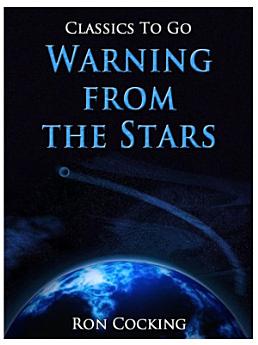Warning from the Stars
Dec 2015 · Otbebookpublishing
Ebook
19
Pages
family_home
Eligible
info
reportRatings and reviews aren’t verified Learn More
About this ebook
A story about flying saucers: IT WAS a beautifully machined container, shaped like a two pound chocolate candy box, the color and texture of lead. The cover fitted so accurately that it was difficult to see where it met the lip on the base. Yet when Forster lifted the container from the desk in the security guards' office, he almost hit himself in the face with it, so light was it. He read the words clumsily etched by hand into the top surface with some sharp instrument:
About the author
Ron Cocking, an enigmatic figure in 20th-century science fiction, carved a niche for himself with his visionary storytelling and thought-provoking narratives. Born in 1927, Cocking's early life was marked by the turbulence of World War II, which profoundly influenced his worldview and literary themes. His works often grappled with the ethical implications of technological advancements and the existential dilemmas faced by humanity in an increasingly mechanized world.Cocking's literary journey began in the post-war era, a time ripe with optimism and trepidation about the future. He quickly gained a reputation for his ability to weave complex scientific concepts with deeply human stories, making his work accessible yet intellectually stimulating. His contemporaries, including giants like Isaac Asimov and Arthur C. Clarke, respected his unique voice and innovative ideas.One of the most intriguing aspects of Cocking's career was his involvement in several controversies. He was an outspoken critic of government censorship and a fervent advocate for intellectual freedom, often clashing with authorities and conservative critics. This rebellious streak endeared him to a generation of readers who saw him as a champion of free thought and expression.Cocking's influence extended beyond his written work; he was a mentor to many emerging writers, encouraging them to push the boundaries of the genre. His revolutionary ideas about artificial intelligence, space exploration, and the future of humanity have left an indelible mark on contemporary science fiction, inspiring countless authors to explore new frontiers.In an era where the line between science fiction and reality continues to blur, Ron Cocking's legacy endures, reminding us of the power of imagination and the importance of questioning the world around us.
Rate this ebook
Tell us what you think.
Reading information
Smartphones and tablets
Install the Google Play Books app for Android and iPad/iPhone. It syncs automatically with your account and allows you to read online or offline wherever you are.
Laptops and computers
You can listen to audiobooks purchased on Google Play using your computer's web browser.
eReaders and other devices
To read on e-ink devices like Kobo eReaders, you'll need to download a file and transfer it to your device. Follow the detailed Help Center instructions to transfer the files to supported eReaders.




